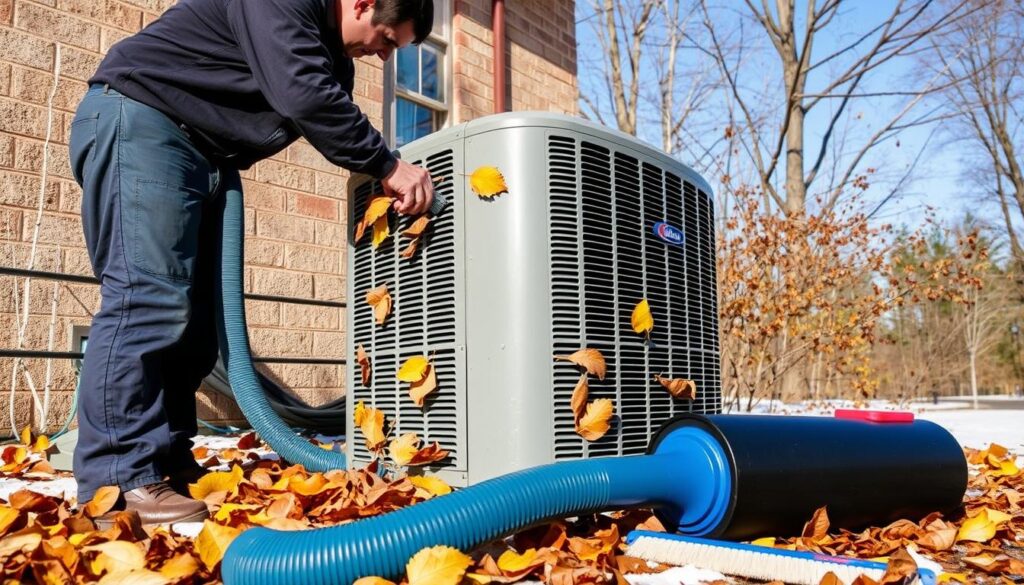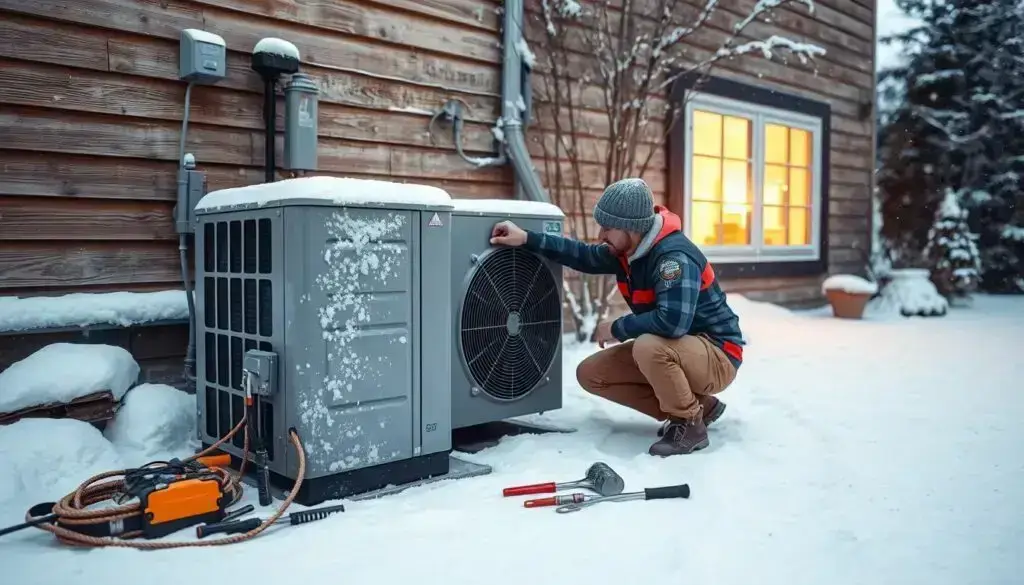As the chill of winter approaches in Hampton Roads, Virginia, typically around late October to early November, it’s crucial to ensure your HVAC system is prepared to handle the colder months. Preparing your system not only enhances its energy efficiency but also reduces utility costs, a significant concern for residents in the area. Moreover, proper maintenance can extend the lifespan of your heating equipment, saving you from potential costly repairs. This guide will walk you through steps to winterize your HVAC system, ensuring you stay warm, comfortable, and energy-efficient throughout the winter in Hampton Roads.
Understanding the Importance of Winter HVAC Preparation
As winter approaches, ensuring your HVAC system is adequately prepared is crucial. Proper maintenance not only enhances its efficiency but also conserves energy and extends its lifespan. Recognizing its significance helps maintain a warm home and reduces utility expenses.
Enhancing Energy Efficiency
A well-maintained HVAC system requires less energy to heat your home. Routine inspections, timely filter replacements, and duct evaluations contribute to this efficiency. Consequently, energy consumption is minimized, leading to lower utility bills.
Financial Savings
Preparing your HVAC system can result in significant cost savings. It prevents unexpected breakdowns, prolongs the system’s lifespan, and optimizes energy use. This reduces the need for costly repairs or replacements.
Factors for System Longevity
Regular maintenance can significantly extend the life of your HVAC system. Early problem detection, component cleaning, and ensuring proper airflow are critical. This proactive approach can help you avoid premature system replacement, saving money in the long run.
| Benefit | Impact |
|---|---|
| HVAC Efficiency | Improved energy consumption, lower utility bills |
| Cost Savings | Reduced repair and replacement costs |
| System Longevity | Prolonged lifespan of HVAC equipment |
“Proper HVAC maintenance is an investment that pays dividends through improved efficiency, cost savings, and extended system lifespan.”
Schedule Professional HVAC Maintenance Service in Hampton Roads
Preparing your HVAC system for winter is essential to ensure optimal performance and longevity, especially in the Hampton Roads area. Scheduling a professional HVAC maintenance service is a vital step in this process. This service includes a comprehensive inspection, cleaning, and any necessary repairs to maintain your system’s efficiency throughout the colder months in Hampton Roads.
During an HVAC tune-up, specialists in Hampton Roads conduct a detailed examination of your system. They assess the thermostat, air filters, and refrigerant levels. Additionally, they clean the system to enhance airflow and boost energy efficiency, ensuring your HVAC system is ready for the Hampton Roads climate.
| HVAC Tune-up Tasks | Benefits |
|---|---|
|
|
Getting a professional HVAC maintenance service before winter offers many benefits. It improves energy efficiency, cuts down on energy costs, and extends your HVAC’s life. Regular preventive care also prevents sudden breakdowns, keeping your home warm and cozy all winter.
“Scheduling a professional HVAC tune-up is one of the best investments you can make to prepare your home for the winter. It’s a small price to pay for the peace of mind and long-term savings it can provide.”
Key Steps to Prepare Your HVAC System for Winter
With winter approaching, it’s crucial to prepare your HVAC system to ensure your home remains warm and comfortable. By following a few essential steps, you can enhance your heating system’s efficiency, save energy, and reduce costs.
Thermostat Programming Tips
Optimal thermostat programming is essential for winter comfort. Set it to maintain a cozy temperature during the day, then lower it slightly at night or when you’re away. This simple adjustment can significantly impact your energy consumption and expenses.
Air Filter Replacement
Replacing your HVAC air filters is crucial for maintaining clean air and optimal system performance. Before winter, inspect your filters and replace any that are dirty or clogged. Clean filters improve airflow, save energy, and prolong the life of your heating system.
Air Duct Inspection
Inspecting your air ducts is another vital step in winter preparation. Check for damage, leaks, or blockages that could hinder the even distribution of warm air. If you detect any issues, seal the ducts or hire a professional to repair them, ensuring your heating system operates at its best.
By taking these steps, you can ensure your HVAC system is winter-ready, keeping your home warm and cozy throughout the season.
Clean and Clear Outdoor HVAC Units
Keeping your HVAC system’s outdoor units clean is key for top performance and long life. Regular cleaning and clearing debris around the outdoor condenser greatly improves your home’s heating and cooling. It also extends the system’s lifespan.
Removing debris like leaves, twigs, or grass clippings is a major part of outdoor unit maintenance. This buildup can block airflow, lowering system efficiency and risking damage. Simple debris removal can significantly improve your HVAC system’s performance.
It’s also vital to clean the condenser coils regularly. These coils are essential for heat exchange. Keeping them clean of dirt and grime boosts system performance. A thorough cleaning, by you or a pro, ensures the coils work well, enhancing your home’s comfort and energy efficiency.
| Maintenance Task | Frequency | Benefits |
|---|---|---|
| Debris Removal | Monthly | Improved airflow, system efficiency, and longevity |
| Condenser Coil Cleaning | Annually | Enhanced heat exchange, energy savings, and system performance |
By focusing on outdoor unit maintenance, including debris removal and condenser care, your HVAC system will run smoothly all year. This keeps your home cozy and your energy bills down.

Inspect and Seal Air Ducts for Maximum Efficiency
Keeping your HVAC system running well is key. One important area to check is your air ducts. If you ignore air leaks, you could lose a lot of energy. This can make your system work less efficiently and increase your energy bills.
Common Duct Leakage Points
Leaks can happen in many places in your ductwork. They often show up at joints, seams, and where ducts connect. Some common spots for air leaks include:
- Duct-to-duct connections
- Duct-to-register connections
- Duct-to-air handler connections
- Holes or gaps in the ductwork
Finding and fixing these leaks is vital for keeping your ducts sealed and your energy use down.
Proper Sealing Techniques
To seal your air ducts well, mix mastic sealant with metallic tape. First, spread mastic sealant on all duct joints and seams. This will create a tight seal. Then, add metallic tape on top to add extra protection and stop leaks.
When to Call a Professional
Some homeowners can handle simple duct sealing tasks. But, if you think you have big air leaks or system problems, get a pro. A skilled HVAC technician can check your system, find all leaks, and fix them. They’ll make sure your HVAC runs efficiently and saves you money on energy.
Test Your Heating System Before Cold Weather
As winter gets closer, it’s key to check your home’s heating system. A detailed heating system check, furnace testing, and heat pump inspection before winter can prevent expensive repairs. It also keeps your family warm and cozy.
Testing your HVAC system is a crucial step for winter prep. You need to check the thermostat, blower, and heat exchanger. This ensures they work right.
- First, set your thermostat to winter settings and check if it works.
- Then, look at the air filters and change them if needed. This keeps air flowing well and saves energy.
- Lastly, get a pro to inspect and tune-up your system. This makes sure it’s ready for winter’s cold.
Testing your heating system early means your home will stay warm and cozy. Don’t wait until it’s too late. Book your heating system check-up now and avoid future problems.
| Heating System Component | Inspection Checklist |
|---|---|
| Thermostat | Verify thermostat is properly calibrated and responding to temperature changes |
| Blower | Ensure blower is running smoothly and providing adequate air circulation |
| Heat Exchanger | Check for any cracks or damage to the heat exchanger, which could indicate a safety issue |
| Air Filters | Replace air filters to maintain optimal airflow and indoor air quality |
“Preparing your heating system for winter is a small investment that can pay off significantly in terms of energy savings, system longevity, and, most importantly, your family’s comfort.”
Check and Replace Air Filters
Keeping your HVAC filters clean is key for your system’s best performance. Replacing filters often improves air quality and saves energy. It also makes your system last longer. Let’s look at the different filters, when to replace them, and how they affect your home’s air.
Types of Air Filters
There are many air filters for HVAC systems. Each catches different kinds of dust and particles. Here are some common ones:
- Fiberglass filters: They catch big particles like dust and pollen.
- Pleated filters: These filters trap smaller particles, like mold and pet dander.
- HEPA (High-Efficiency Particulate Air) filters: They remove up to 99.97% of tiny particles, including germs and viruses.
- Activated carbon filters: These filters are great at getting rid of smells and harmful chemicals in the air.
Replacement Schedule Guidelines
How often you need to change your filters depends on a few things. These include the filter type, how many people live in your home, and your area’s air quality. Here’s a general rule:
- Fiberglass and pleated filters need to be changed every 1-3 months.
- HEPA and carbon filters can last 6-12 months before needing a swap.
- If you have pets, live with many people, or are in a polluted area, change your filters more often.
Impact on Indoor Air Quality
Clean filters are vital for good indoor air. Dirty filters let bad particles into your home. This can cause health problems like breathing issues and allergies. Replacing filters regularly helps keep your air clean and healthy for your family.
| Filter Type | Filtration Efficiency | Replacement Frequency |
|---|---|---|
| Fiberglass | Basic | 1-3 months |
| Pleated | Enhanced | 1-3 months |
| HEPA | Excellent | 6-12 months |
| Activated Carbon | VOC and odor removal | 6-12 months |
By replacing your HVAC filters often, your home stays comfy, saves energy, and has clean air all year.
Optimize Thermostat Settings for Winter
As winter comes, it’s key to adjust your thermostat for comfort and savings. Use energy-efficient settings and programmable thermostats to control your temperature control. This way, your home stays warm without costing too much.
Managing energy use in winter is easier with the right thermostat settings. Keep your home between 68°F and 72°F when you’re there. At night or when out, lower it to 55°F to 60°F.
- Use “away” or “sleep” settings on your thermostat to save energy when you’re not home or asleep.
- Think about getting a smart thermostat. It learns your habits and adjusts the temperature for you.
- Change your thermostat settings when you have guests or your routine changes. This keeps your home cozy without wasting energy.
By following these energy-efficient settings and programmable thermostat tips, you can control your temperature control. Enjoy a warm and affordable winter.
“Adjusting your thermostat just a few degrees can make a significant impact on your heating costs without sacrificing comfort.”
| Recommended Temperature Range | Energy Savings |
|---|---|
| 68°F – 72°F (when home) | Maintains comfort while reducing heating costs |
| 55°F – 60°F (when away or sleeping) | Can save up to 10% on heating bills |
Optimizing your thermostat for winter helps you stay cozy and saves on heating costs. Take charge of your temperature control and enjoy a warm winter.
Inspect Carbon Monoxide Detectors
As winter gets closer, make sure your home has working carbon monoxide (CO) detectors. These devices are key to keeping your family safe from CO gas. CO gas is silent and odorless, but very dangerous.
Placement Recommendations
Put CO detectors on every floor of your home, including bedrooms and living areas. Place them near sources of CO, like furnaces and fireplaces. Make sure they’re not blocked by furniture or other items.
Battery Replacement Schedule
- Change the batteries in your CO detectors every six months, at the start of each season.
- Think about getting detectors with long-lasting batteries. This makes upkeep easier.
- Check your CO detectors every month to make sure they’re working right.
Safety Protocol Review
If a CO alarm goes off, have a plan ready. Teach your family what to do. This includes leaving the house, calling for help, and staying outside until it’s safe.
By checking and keeping your CO detectors in good shape, you improve home safety. This helps avoid gas leak problems and keeps your family safe during winter. Stay alert and take action to protect your home from CO detection dangers.
Address Common Winter HVAC Issues
As winter comes, your HVAC system might face many challenges. These can affect how well it works and how efficient it is. Issues like frozen pipes and thermostat problems are common. Knowing how to fix these can help keep your system running well all winter.
Frozen pipes or parts are a big problem in winter. This happens when your system isn’t well-insulated or when it gets very cold. If you see frozen parts, you need to act fast to avoid more damage. Using a space heater or hair dryer to thaw them might work. But, if it doesn’t, you should call a professional HVAC technician.
Thermostat problems are another common issue. If your thermostat doesn’t read the temperature right or doesn’t talk to your HVAC system, it can cause heating problems. Check the batteries, calibration, and wiring to fix it. But, if it still doesn’t work, a pro might need to replace it or find a bigger problem.
FAQ
What are the benefits of preparing my HVAC system for winter?
Preparing your HVAC system for winter can save you money and make it last longer. Regular maintenance keeps your heating system working well. This means lower bills and fewer repairs during the cold months.
How often should I schedule professional HVAC maintenance service?
Get your HVAC system checked by a pro at least once a year, before winter starts. This service includes a detailed check, cleaning, and repairs. It ensures your system works best in the cold weather.
What are the essential steps to prepare my HVAC system for winter?
To get your HVAC ready for winter, start by setting your thermostat wisely. Then, change your air filters and check your ducts for leaks. Clean your outdoor units and test your heating system to fix any problems early.
How do I ensure my outdoor HVAC units are properly maintained for winter?
To keep your outdoor units in good shape for winter, clear away debris and clean the coils. Also, protect them from harsh weather. This keeps your system running smoothly all winter.
Why is it important to inspect and seal air ducts for maximum HVAC efficiency?
Fixing air duct leaks is key to saving energy. Leaks can make your bills go up and your home less comfortable. Sealing your ducts well helps your heating system work its best.
How do I know if my heating system is working properly before winter?
Test your heating system before winter hits. Turn it on, listen for odd sounds or smells, and check the airflow and temperature. Fixing problems early keeps your system working when you need it most.
How often should I replace my HVAC air filters?
How often to change your air filters depends on the type and how much you use your system. Usually, change them every 1-3 months, especially in winter. This keeps the air in your home clean and your system running well.
What are the recommended thermostat settings for winter?
For energy savings and comfort in winter, set your thermostat to 68°F when you’re home. Lower it to 55-60°F when you’re sleeping or out. A programmable thermostat makes these changes easy and saves you money.
Why is it important to inspect carbon monoxide detectors before winter?
Carbon monoxide detectors are vital for safety in winter. Check them, make sure they’re in the right place, and replace batteries as needed. This protects your family from carbon monoxide poisoning.
What are some common winter HVAC issues I should be aware of?
Watch out for frozen pipes, thermostat problems, clogged air filters, and less airflow in winter. Knowing these issues and fixing them early keeps your home warm and comfortable all winter.


